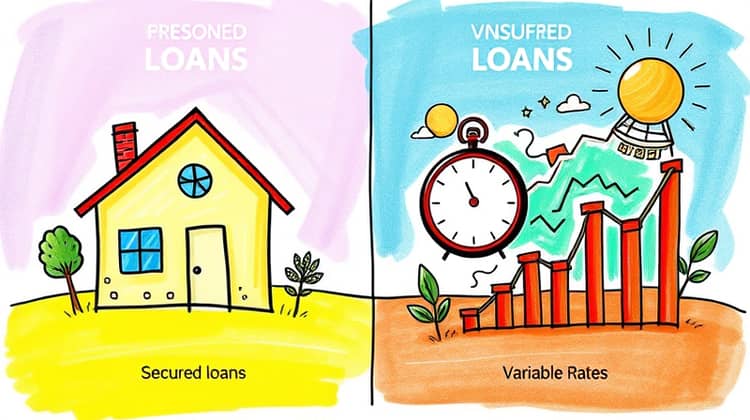When it comes to securing a personal loan, navigating the lending landscape can be challenging. However, with the right preparation and information, you can enhance your chances of getting approved. This article provides essential tips to guide you through the process of obtaining a personal loan successfully. Whether you're planning for a home improvement project, consolidating debt, or simply need some extra cash, these tips will help align your financial health with the requirements set by lenders.
From understanding the various types of personal loans available to ensuring that you have the proper documentation in place, each step is critical. By taking the time to research and prepare, you can position yourself as a desirable candidate for lending institutions. Let's delve into the details and empower you to make informed decisions that can lead to loan approval.
Understand the Different Types of Personal Loans

Before diving into the application process, it's crucial to familiarize yourself with the types of personal loans available. Different loans cater to various needs and borrower circumstances, which makes understanding your options essential to your success. The most common types of personal loans include secured and unsecured loans, as well as fixed and variable rate loans.
Secured loans require collateral, such as a savings account or property, while unsecured loans do not require any collateral but may come with higher interest rates. Additionally, fixed rate loans maintain the same interest rate throughout the life of the loan, whereas variable rate loans can change over time based on market conditions. Being knowledgeable about these differences can help you choose the right loan to fit your financial situation.
- Secured loans
- Unsecured loans
- Fixed rate loans
- Variable rate loans
Choosing the type of personal loan that aligns with your financial needs is an important first step in your lending journey. This knowledge sets the stage for making informed decisions as you seek approval from lenders.
Check Your Credit Score

Your credit score is one of the primary factors that lenders use to assess your eligibility for a personal loan. A higher credit score demonstrates a history of responsible borrowing and can significantly increase your chances of approval. Before applying for a loan, obtain a copy of your credit report and review it for accuracy. If there are any errors, take the necessary steps to correct them promptly.
Additionally, it's wise to take stock of your overall credit history, including any outstanding debts, payment history, and length of credit history. Understanding your credit profile will give you a clearer picture of where you stand and what you might need to improve before submitting a loan application.
Keep in mind that different lenders may have varying requirements for credit scores, but in general, a score above 700 is considered good and will give you better chances for favorable interest rates and terms.
Research Lenders and Loan Options

With a solid understanding of personal loan types and your credit profile, the next step is to research potential lenders. Not all lenders operate the same way; therefore, comparing multiple options can help you find the best deal. Consider factors such as interest rates, fees, customer reviews, and loan terms when evaluating lenders.
Explore both traditional banks and online lenders for a broader perspective on what is available. Online lenders often provide expedited approval processes and may have more flexible requirements, making them an attractive option for many borrowers.
- Traditional banks
- Credit unions
- Online lenders
- Peer-to-peer lenders
After identifying different lenders and their offerings, you can shortlist those who appear to provide the best overall fit for your needs and financial capacity. This will help streamline the application process and improve your odds of securing a loan.
Gather Necessary Documentation

Now that you have researched your options, it's time to gather the necessary documentation to support your application. Most lenders will require proof of identity, proof of income, and information regarding your employment status. Be prepared to provide documents such as pay stubs, tax returns, and bank statements. Having these documents organized in advance can expedite the application process.
In addition to income verification, some lenders may request personal information such as your Social Security number, existing debt information, and details regarding your monthly expenses. This helps the lender assess your financial stability and repayment capacity.
Lastly, if you are applying for a secured loan, you'll also need to provide documentation related to the collateral you intend to use, such as property appraisals or vehicle titles.
- Proof of identity
- Proof of income
- Employment information
- Existing debt information
Having all of your documentation prepared before applying will not only improve the chances of approval but also demonstrate to lenders that you are responsible and organized.
Improve Your Debt-to-Income Ratio

Your debt-to-income (DTI) ratio is another critical metric that lenders use to evaluate your financial health. This ratio compares your total monthly debt payments to your gross monthly income, providing insight into your ability to manage additional debt. A lower DTI ratio is generally more favorable, and improving it can boost your chances of loan approval.
To calculate your DTI, add up your monthly debt payments (like credit card bills, existing loans, and other obligations) and divide that number by your gross monthly income. Lenders typically prefer a DTI ratio of less than 36%, but lower is always better. If your DTI is high, consider strategies to reduce your monthly debt payments, such as paying off small debts or consolidating debts where appropriate.
By taking active steps to improve your DTI ratio, you enhance your creditworthiness in the eyes of lenders, making it easier for you to qualify for a personal loan.
Consider a Co-Signer

If your credit score or financial history isn't ideal, consider finding a co-signer to support your loan application. A co-signer is someone with strong credit who agrees to take on the responsibility of the loan if you're unable to repay it. Having a co-signer can make you more appealing to lenders and may even lead to better loan terms, such as lower interest rates.
It's important to communicate openly with your co-signer about the responsibilities and risks associated with co-signing a loan. Not only will their credit be affected if you fail to make payments, but it’s essential to ensure that both parties are on the same page regarding repayment responsibilities.
- Find someone with good credit to co-sign
- Discuss repayment responsibilities openly
- Ensure mutual understanding of the risks
With a trustworthy co-signer, you can significantly increase your chances of approval and potentially secure a loan with better terms, making it a strategy worth considering if you're struggling to qualify on your own.
Be Mindful of Loan Terms and Interest Rates

Understanding loan terms and conditions is crucial before signing any agreement. Familiarize yourself with interest rates, repayment terms, and any fees associated with the loan. Look for loans with competitive interest rates, as even a small difference can impact the total repayment amount significantly.
Additionally, pay attention to the repayment timeline and whether the loan offers flexible payment options. Some loans come with penalties for early repayment, while others may provide options for deferment under certain circumstances.
Being thorough in this step not only allows you to make prudent financial decisions but also protects you from hidden costs that may arise during the loan period.
- Compare multiple offers
- Look for flexible repayment options
- Read loan agreements carefully
Being well-informed about the particulars of your loan will help you navigate the terms more smoothly and alleviate any potential issues down the line.
Plan for Loan Repayment

Once you secure your personal loan, devising a suitable repayment strategy is essential. Create a budget that allows for timely monthly payments while still managing your other expenses. A well-thought-out plan will help you stay on track and avoid falling behind. Track your spending and make adjustments to ensure that the loan payments are prioritized.
It’s also worthwhile to consider setting up automatic payments if your lender offers that option. Automation can simplify the repayment process and help you avoid late fees due to missed payments. Additionally, keep an emergency fund to prepare for unexpected expenses that may impact your ability to make payments.
Consistent payments will help improve your credit score over time and demonstrate financial responsibility, which can be beneficial for future borrowing. Start early and ensure you maintain discipline throughout the repayment period.
Developing a comprehensive repayment strategy reflects your commitment to fulfilling your financial obligations and can pave the way for a healthier financial future.














